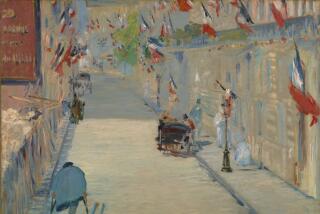Op-Ed: How politics built L.A.’s Gold Line at the expense of a smarter system
The opening this month of the Gold Line extension from Pasadena to Azusa is an example of how voter-approved tax dollars are now delivering real transit projects for Los Angeles. It is also an example of how politics often dictate how and where Metro builds.
Better mass transit is necessary across the region. But not every part of the county has the population to support rail. In the case of the Gold Line, we’ve brought expensive train technology to a generally low-density area that could be more economically served by bus rapid transit or commuter buses running in the right-of-way.
Politics brought the Gold Line into existence. In building the first leg from Union Station to Pasadena, local leaders bypassed areas with greater potential ridership because the Pasadena route had powerful political supporters, including critical bipartisan backing at the federal level from then-Rep. David Dreier.
Politics were also behind the decision to build the extension in the San Gabriel Valley, which ranked as one of the least cost-effective of the planned county rail projects.
Back in 2008, rail boosters needed two-thirds support from Los Angeles voters for the sales tax increase for transportation known as Measure R — a threshold required by Proposition 13. The measure would fund important transit projects all around the county, from the Purple Line subway under Wilshire Boulevard to the Expo Line to Santa Monica.
San Gabriel Valley leaders argued that their region was being unfairly left out of the coming transit boom, and they repeatedly threatened to block the measure from even appearing on the ballot. In reality, they were always slated to get a gold-plated rail line. But Metro officials had to give the Gold Line extension priority in the funding plan in order to secure voter support along the route.
In some ways, the Gold Line extension is the price we all had to pay to secure funding for more cost-effective rail lines in densely populated parts of the county.
In some ways, the Gold Line extension is the price we all had to pay to secure funding for more cost-effective rail lines in densely populated parts of the county, which are now under construction.
Now that the Gold Line extension is operational, San Gabriel Valley leaders should be proactive about creating demand along the route. They should do everything they can to build more housing and offices near the stations — the optimal way to capitalize on the investment.
More residents and workers within walking or biking distance of the stations will boost ridership and therefore fare revenue, as well as provide badly needed opportunities to house and employ a growing population.
Going forward, Metro should be more willing to reject inefficient rail proposals in favor of more cost-effective options. The agency should consider prioritizing high-speed busways in dedicated lanes, such as the Wilshire Boulevard bus-only lane and the Orange Line in the San Fernando Valley, as well as on major freeways.
While most voters respond better to the idea of a shiny new rail line than a bus, buses on dedicated lanes can in fact provide much of the speed and reliability of rail, at a fraction of the cost. And those saved dollars can then be reinvested in other parts of the county to bring even more mobility benefits.
Meanwhile, state leaders should push to change the Proposition 13 requirement for a two-thirds voter approval threshold for local transit tax measures.
This high bar results in political compromises that often undermine the effectiveness of public dollars.
Los Angeles has limited funds for transit projects, while facing enormous regional mobility needs. We can’t afford rail projects that don’t deliver sufficient benefits or guarantee smart development around the stations.
As Metro leaders now craft a plan for new projects and another, $120-billion ballot measure this November, they should avoid repeating the mistakes of the past.
Ethan N. Elkind researches and writes on environmental law and policy with a joint appointment at the UC Berkeley and UCLA Schools of Law. He is the author of the book Railtown: “The Fight for the Los Angeles Metro Rail and the Future of the City.”
Follow the Opinion section on Twitter @latimesopinion and Facebook
More to Read
A cure for the common opinion
Get thought-provoking perspectives with our weekly newsletter.
You may occasionally receive promotional content from the Los Angeles Times.










